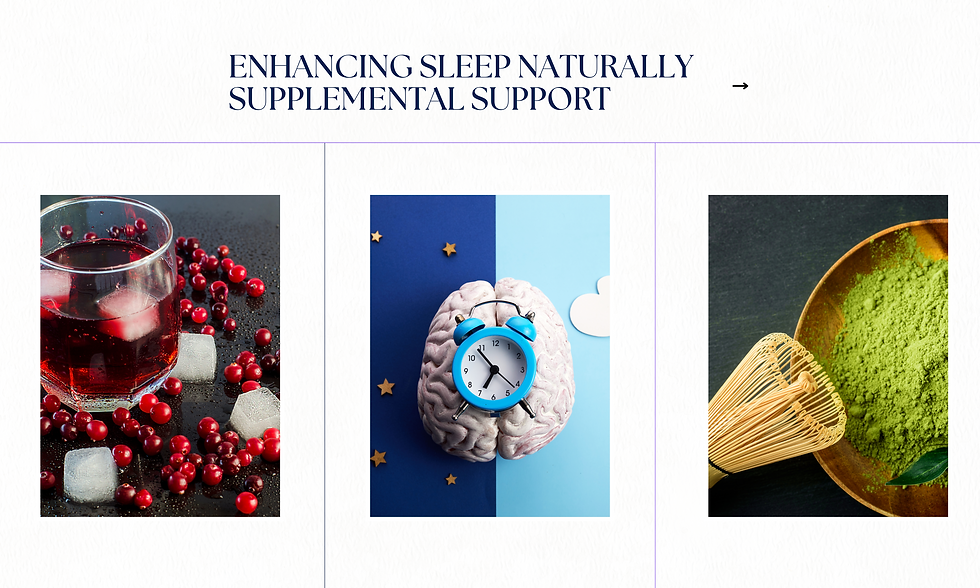Journey to Restful Nights: Personal Insights and Strategies
- Estee Dvora
- Mar 11, 2024
- 3 min read

Disclaimer: The following insights and recommendations are derived from my personal journey and independent research into enhancing sleep quality. They are shared with the intent of offering alternative perspectives and are not a substitute for professional medical advice. Please consult with a healthcare professional before adopting new health practices or supplements.
Achieving a good night's sleep is crucial for our overall health and well-being, impacting everything from our mood to our risk for chronic diseases, in addition to healing my autoimmune disease. Through trial, error, and extensive research, I've discovered several strategies that have profoundly improved my sleep quality and cycle. Here are my top tips and insights for those seeking more restful nights.
1. The Power of Unwinding
The hustle of daily life can leave our minds buzzing at bedtime, making it hard to fall asleep. I've found that establishing a pre-bedtime ritual of relaxation helps signal to my body that it's time to wind down. Whether it's a warm bath, reading a book, or listening to calming music, these activities can significantly improve your ability to fall asleep.
2. Establishing a Sleep-friendly Routine
Consistency is key to a healthy sleep cycle. Setting a regular bedtime and wake-up time helps regulate your body's internal clock, making it easier to fall asleep and wake up naturally. My journey showed me the importance of consistency, even on weekends.
3. Creating a Tech-free Sanctuary
The blue light emitted by screens can interfere with melatonin production, a hormone crucial for sleep. I've made my bedroom a technology-free zone, avoiding screens for at least an hour before bed. This simple change was a game-changer for my sleep quality.
4. Optimizing the Bedroom Environment
Sleep comfort goes beyond just having a good mattress. The temperature, noise levels, and even the colors of your room can influence sleep quality. I found that maintaining a cool, quiet, and dark environment significantly enhances my sleep.
5. Saying No to the Clock
Clock-watching can exacerbate sleeplessness and stress. If you find yourself checking the time frequently, try turning the clock away. Learning to focus on rest and relaxation instead of time has been beneficial for my sleep mindset.
6. Nutritional Choices for Better Sleep
Diet plays a surprisingly significant role in sleep quality. Incorporating foods rich in tryptophan, magnesium, and melatonin, such as almonds and cherries, has helped improve my sleep. Conversely, minimizing caffeine and heavy meals before bed made falling asleep easier.
7. Embracing the Dark
Our ancestors slept in complete darkness, which naturally supported their sleep-wake cycles. Reducing exposure to artificial light at night and ensuring my sleeping environment is as dark as possible has made a noticeable difference in how quickly I fall asleep.
8. Keeping Active
Regular physical activity has been instrumental in improving my sleep. However, timing is crucial; engaging in vigorous exercise too close to bedtime can be counterproductive. Finding the right balance and timing for exercise can enhance sleep quality.
9. Focusing on Sleep Quality Over Quantity
It's not just about how long you sleep but how well you sleep. Minimizing disturbances and maintaining a continuous sleep cycle helps ensure that the sleep I do get is restorative and refreshing.

In my quest for better sleep, I've also delved into natural supplements that can support a healthier sleep cycle, each with its unique benefits:
Melatonin: Using melatonin supplements has helped me adjust my sleep-wake cycle, particularly useful during times of travel or when my daily routine undergoes significant changes.
Magnesium: I've found magnesium to be incredibly effective in calming my nervous system, which in turn, promotes a more restful state and improves the quality of my sleep. I've been making my sleepy night Mocktail - 1/2 cup tart cherry juice, 1-2 tsp magnesium powder, Sparkling water and Ice
Tart Cherry Juice: Contains tryptophan + melatonin to regulate sleep
L-Theanine: Although L-Theanine, an amino acid found in green tea, promotes relaxation and can improve sleep quality, it's worth noting that green tea contains caffeine. Therefore, I've found it beneficial to consume L-Theanine supplements or drink green tea earlier in the day to avoid the less intense, but still present, stimulant effects of caffeine close to bedtime. This way, I can enjoy the calming benefits of L-Theanine without disrupting my sleep cycle.
Adopting these natural supplements and practices has profoundly impacted my journey towards achieving restful and rejuvenating sleep. However, it's essential to approach any new supplement with caution and consult a healthcare professional to ensure it's appropriate for your health profile and needs. By tuning into your body's responses and making informed choices, you can find a personalized pathway to better sleep and, consequently, better health.




Comments